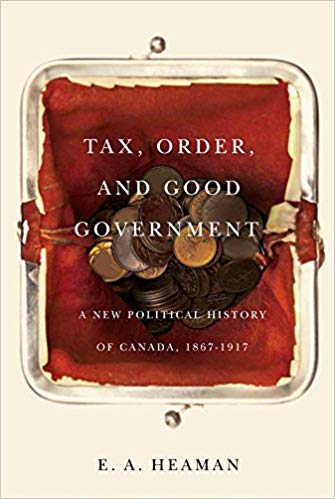Tax, Order, and Good Government: A New Political History of Canada, 1867-1917.
Review By Michael J. Prince
March 8, 2018
BC Studies no. 197 Spring 2018 | p. 177-8
 E.A Heaman has produced a decided masterpiece on a topic too often thought to be dry as a bone. Taxation, with its underlying legitimacy of consent, is the lifeblood of the state, supplying it with vital financial resources and policy tools that radiate outward through laws, staff, agencies, and program activities connecting to individuals and households and to markets and communities. Taxation and the corresponding appeals for tax fairness and demands for tax relief have continually been part of debates about public intervention, the role and size of government, the relation between the state and the economy, and the nature of citizenship and a fair and good society. As Heaman observes: “All taxing communities are always already in the middle of a debate about wealth, poverty, and taxation” (5).
E.A Heaman has produced a decided masterpiece on a topic too often thought to be dry as a bone. Taxation, with its underlying legitimacy of consent, is the lifeblood of the state, supplying it with vital financial resources and policy tools that radiate outward through laws, staff, agencies, and program activities connecting to individuals and households and to markets and communities. Taxation and the corresponding appeals for tax fairness and demands for tax relief have continually been part of debates about public intervention, the role and size of government, the relation between the state and the economy, and the nature of citizenship and a fair and good society. As Heaman observes: “All taxing communities are always already in the middle of a debate about wealth, poverty, and taxation” (5).
For readers of BC Studies and especially for students of BC politics, matters of taxation are central to modern provincial political debates and public policy decisions. The bungled attempt by the Gordon Campbell Liberal government to introduce a harmonized sales tax (combining the federal Goods and Services Tax with the provincial sales tax) is but one example. Contemporary links between taxing and governing are myriad: the carbon tax on carbon dioxide emissions, a low-income climate action tax credit, small business income tax relief, the film incentives BC tax credit, the Vancouver foreign homebuyer’s tax, and the abolition of bridge tolls, and the phasing out of premiums for financing the Medical Services Plan. As in our history, governments today pursue a remarkable variety of economic, financial, social, cultural, and political goals through taxation rates, obligations, credits, penalties, and exemptions. At the level of municipalities, provinces, territories, First Nations, or the federal government, we have a tête-à-tête with taxation.
Heaman provides an engaging account of Canada’s first half-century through the lens of tax policy. Her objectives are to document the cultural and social history of the politics about taxation by examining discrete tax revolts by various popular interests and by showing how taxes are mediated between wealth and poverty. Her contributions are to write poverty back into the political narrative of Canada from 1867 to 1917 and to pay close attention to public opinion and populist agency in debates over the state collection and allocation of financial resources. We see this history of tax policies and tax debates from the vantage point of local publics as well as from provincial and national politicians.
A chapter devoted to British Columbia – the first province, in the mid-1870s, to introduce direct provincial taxation on the general public – describes a tax system designed to sustain British identity and white settler rule through “racialized taxation” of Chinese and Indigenous peoples. A major conclusion about tax history from this case study and the overall book is that “unchecked, the rich will tax the poor and stigmatize them as tax evaders, and wherever possible increase both indignation and taxation by racializing that stigma” (463).
A fundamental development from 1917 onwards was the introduction and expansion of a progressive income tax system, a system informed by the ability-to-pay principle and designed to take a larger percentage of the total income of higher-income than of lower-income earners. Another integral principle – equalization – introduced in 1957, commits the federal government to transfer payments to certain provinces to ensure the provision of reasonably comparable public services across the provinces at reasonably comparable levels of taxation. Thus the Victorian liberal state of Canada’s early decades, so well chronicled by Heaman, became an administrative state; laying a foundation for the social welfare state of the second half of the twentieth century and into the twenty-first. This terrific book helps us better understand the contested nature of fiscal citizenship and our inevitable rendezvous with the quintessentially political issues of revenue, wealth, and poverty.
Publication Information
Tax, Order, and Good Government: A New Political History of Canada, 1867-1917.
E.A. Heaman
Montreal & Kingston: McGill-Queen’s University Press. 2017. 600 pp. $39.95 cloth.
